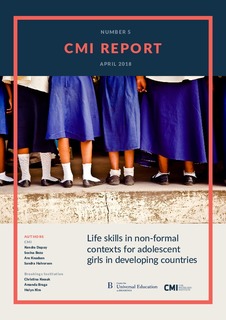| dc.description.abstract | Executive summary
How can young women in developing countries best be prepared for success in their lives and livelihoods? Life preparation requires learning different types of knowledge and skills in formal, non-formal, and informal learning contexts. Since the advent of the Education for All initiative in 1990, the international community has recognized that in addition to academic knowledge like basic literacy and mathematics skills, young people need to learn so-called “life skills” (UNESCO 2004 & 2012; UNICEF 2012). Life skills are the combination of skills (what one has), knowledge (what one knows), and attitudes (what one believes and values) that constitute a set of competencies (what one can do) that enable youth to adapt to, function and thrive in society . They enable individuals to translate knowledge, skills, and attitudes into specific behaviors to cope with, navigate, or transform life’s challenges (Kwauk and Braga 2017). To successfully function as adults in society and to navigate the social, economic, and political challenges of the 21st century, young people must be able to think critically, participate politically, live peaceful and healthy lives, create and pursue economic opportunities, navigate and use new technologies, and process information in ways that translate into positive individual and societal development.
While there is international recognition of the importance of life skills for child and youth development – particularly for achieving positive behavioral change and health outcomes – more knowledge is required to better understand the broad spectrum of life skills that young women in developing countries in particular require, and how non-formal education contexts can best deliver these skills. Young women in these contexts face particular challenges in advancing socially, politically, and economically due to poverty and gender-based discrimination. While the formal education sector i | |
